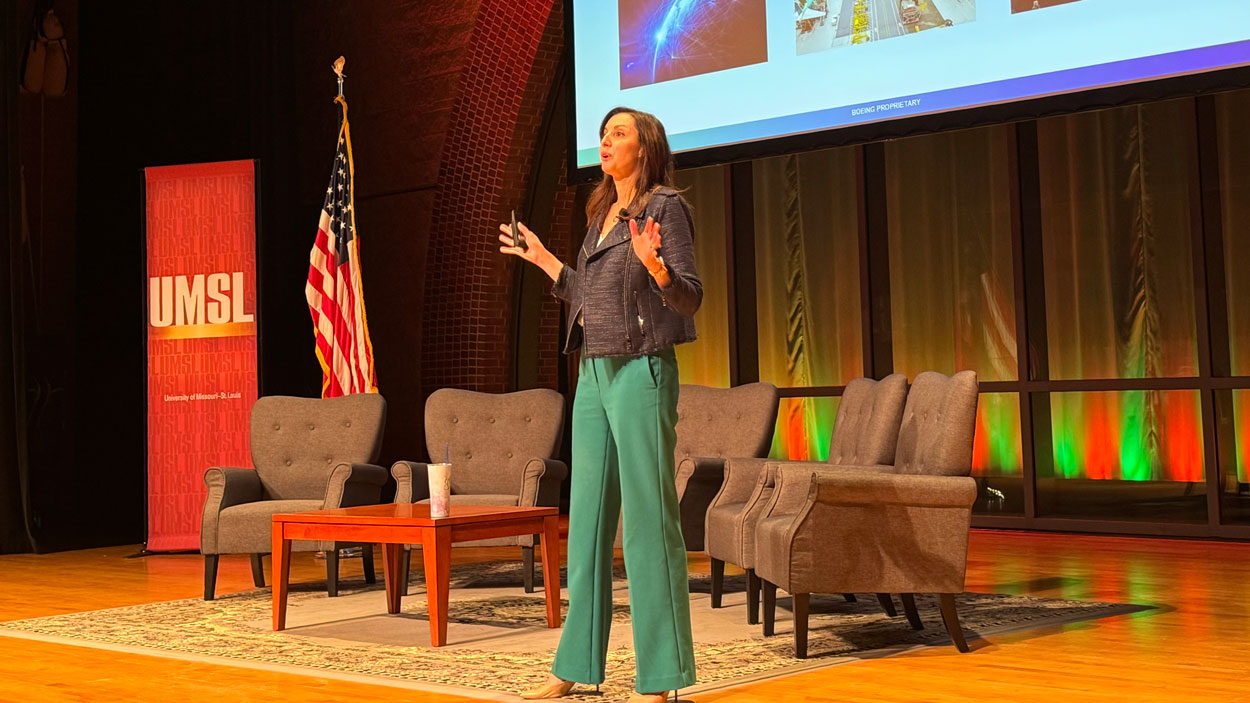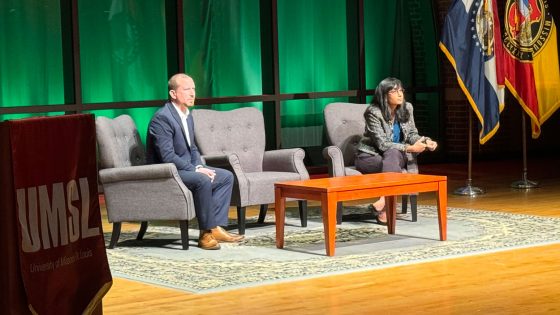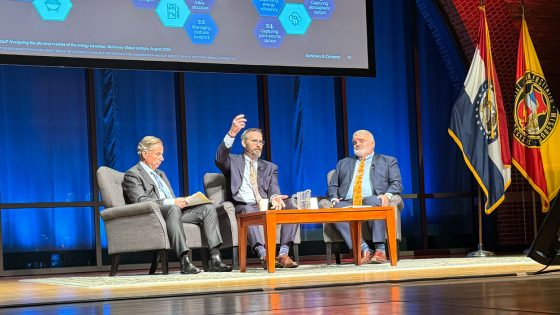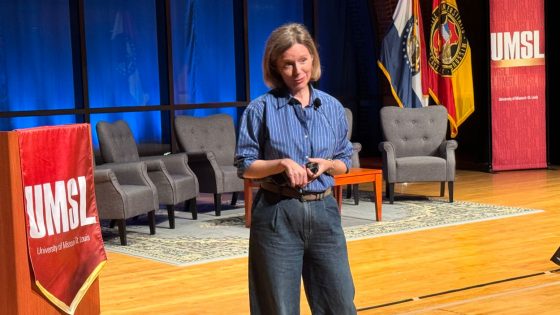
Boeing’s Jill Graftenreed was one of two keynote speakers at the inaugural Sustainability Summit hosted by UMSL’s Global Leadership and Management Department. (Photos by Ryan Fagan)
The 2024 Sustainability Summit, hosted by the University of Missouri–St. Louis’ Global Leadership and Management Department last Thursday, featured a powerful lineup of speakers and panelists sharing research, presenting solutions and interacting with the audience on topics related to the event’s theme, “Energy Transition in Pursuit of Net Zero.”
The Summit featured four speakers – keynote addresses by Mekala Krishnan from McKinsey & Company and Jill Graftenreed from Boeing, along with presentations by Emily Crites from Accenture and Kirk Anderson from Nidec Motors – and two panel discussions, presented by Peabody and Nidec Motors. This was the first event in the Sustainability Summit series, which is scheduled to run from 2024 to 2030.
“The series will focus on complex topics that range from carbon neutrality, ecological restoration, sustainable food systems, food security, waste management and water conservation, among others,” said Bindu Arya, the chair of the Global Leadership and Management Department. “Since transition will not be easy, the Summit series brings together the different players who can share different perspectives, research and real-world implementation challenges to support developing a sustainable roadmap to meet the overall objectives. Chancellor Kristin Sobolik‘s enthusiasm and support for the series has been outstanding.”
After UMSL Provost Steven Berberich welcomed everyone to the Summit, Krishnan, a partner at McKinsey who leads her company’s research on topics related to sustainable and inclusive growth including climate risk and net-zero transition, was the first speaker for the event. She was excited to travel from Boston to speak at the Summit, which was held in the E. Desmond and Mary Ann Lee Theater at the Blanche M. Touhill Performing Arts Center.

After her presentation, McKinsey Global Institute partner Mekala Krishnan (right) engaged in an insightful question-and-answer session Thursday morning.
“The Summit offered a great opportunity to share my research with students, faculty members and business leaders – and through that, hopefully aid their own approach to their work and help them use facts and insights to guide their own decision-making,” Krishnan said. “I thought the event was fantastic, the audience was tremendously engaged and informed, and I very much enjoyed the discussions and questions with the group.
“For me, the main message was to say that what lies ahead will have both challenges and opportunities. Organizations need to understand this, so they can navigate the risks and make the most of opportunities – and through that, increase the likelihood of reaching global climate goals.”
Krishnan energized the audience with not only her data-driven and solution-oriented presentation, but her engaging question-and-answer session. For example, she was asked about how to start a sustainability conversation with groups that might not be initially receptive to the concept.
“Identify what the critical needs of the people you’re communicating with are, and then figure out how the sustainability agenda fits into those needs because that’s when you receive the most adoption, and rightly so,” she said. “People are going to want to do things that help their existing way of life, that do not seem like they would pose a burden to them. Identifying the areas that might be a common ground would be a good place to start.”
The audience members weren’t the only ones paying close attention; nearly every speaker and panelist throughout the event mentioned something Krishnan discussed in her presentation.
“I really appreciated McKinsey’s focus on data and the different aspects of the problem, the importance of affordability and the importance of buy-in from consumers to make it realistic, to make sustainability achievable,” said Maranda Schettler, the director of engineering at Intramotev, who was part of the Nidec panel. “It’s not just about appealing to our good nature, as much as we would like it to be. It’s also about making it something that industries can afford to do and having the regulation and products in place to be able to achieve that.”

R3 Renewables CEO John Jones (center) talks about his company’s goals during the Peabody panel discussion. Patrick Forkin is on the left and Scott Jarobe is on the right.
The Peabody panel discussion was moderated by Patrick Forkin, the chief development officer, and featured Scott Jarboe, the chief administration officer, and John Jones, the CEO of R3 Renewables, a solar energy company that’s a joint venture of Peabody. The panel members talked about Peabody’s history with coal and how the company is transitioning toward the future, specifically reallocating capital toward the production of metallurgical coal, which is used for making steel and has lower ash and sulfur content, and away from the more traditional thermal coal.
Jones spoke to the development of his still-very-new solar company.
“We kicked off this business about two-and-a-half years ago with a focus on developing very large-scale solar and storage projects on reclaimed mining land,” Jones said. “As we talk about energy transition, there are real impacts on some technologies getting phased out over time and other technologies growing, so what we’re doing is building large-scale infrastructure in communities that are directly affected, putting solar farms where coal mines were, and that ends up adding meaningful tax base, meaningful jobs in communities where this is taking place.”
A senior leader of sustainable business and strategy at Accenture, Crites’ presentation focused on the “why” and the “how” of decarbonization, including the financial and non-financial benefits.

Accenture’s Emily Crites answers a question from an audience member sitting near the front of the E. Desmond and Mary Ann Lee Theater inside the Blanche M. Touhill Performing Arts Center.
“When you think about sustainability, it’s not just, how do I decarbonize, it’s how do I treat people better? How do I take care of my planet and the people? It’s all of us together,” she said. “It’s not just the environment. We interact. People ask me all the time, what will happen if we don’t reach Net Zero? The earth will still be here, but what will our lives be like? That’s what we have to think about. It’s for humanity as well.”
Anderson, the director of government affairs at Nidec, spoke about sustainability as it relates to politics, and how to present the benefits of progressive environmental policies in a way that can appeal to people with differing political viewpoints and priorities. One slide in particular stood out, a Venn diagram showing what both parties agree are priorities including economy/jobs, education and health care, while talking points like the climate and minority rights might appeal more to Democrats and talking points like constitutional government and freedom/faith might connect more in conversations with Republicans.
The Nidec panel was moderated by Mark Emanuel, the manager of technology solutions and business development, and featured Dominique Llonch, president and CEO of Nidec Conversion and Vincent Braley, CEO of Nidec Aerospace, along with Schettler and Anderson. Schettler, whose company, Intramotev, is based in St. Louis and closely connected to UMSL and the Joint Engineering Program with Washington University in St. Louis, called sustainability a “forever challenge,” and the other panelists agreed.
“It’s a long-term effort, of course, and we are going on that path of sustainability that is, as I said before, pushed by the market, but the market is also pushing because politicians and governments are pushing it,” said Llonch. “It’s the future of our planet. Sustainability is a long journey, the path to Net Zero.”
Graftenreed, the vice president of sustainability programs, risk and reporting at Boeing, was the final keynote speaker.
“Let’s talk about the really big thing we have been talking about all day, which is climate change emissions, and what are we all going to do to meet a climate transition plan that needs to happen?” she said. “… What we recognize is, we need to be part of the solution going forward. And while it is a big goal, we have ideas about how we’re going to get there.”
Graftenreed talked about the five levers Boeing has identified for moving toward decarbonization within the aerospace division.
- Fleet renewal: Replacing older models with new, more efficient airplanes.
- Operational efficiency: How does the ecosystem leverage data to increase efficiency?
- Renewable energy: Researching hybrid electric platforms, as well as hydrogen
- Advanced technology: Developing systems to produce more efficient flight profiles
- Market-based measures: Diversifying investment strategy to include carbon-removal technologies.
Graftenreed introduced the Boeing Cascade Climate Impact Model, which is a tool that visualizes each of the five different levers and allows you to see their impact on emissions.
“What it really does is allow our customers, it allows regulators, it allows our suppliers to understand the roles each of these levers are going to play, and how we want to shape this going forward together as an industry,” Graftenreed said. “We’ve been working very closely with third parties in academia and industry groups to make sure it is both accurate and transparent and reflective of the industry at large.”














